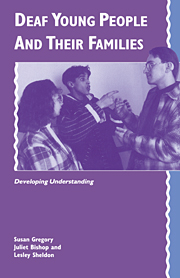Book contents
- Frontmatter
- Contents
- Preface
- Acknowledgements
- 1 The young deaf people and their families
- 2 Family life and communication
- 3 Experiences of education
- 4 The world of work
- 5 Deaf young people in a hearing world
- 6 Friendships, relationships and social life
- 7 Being deaf
- 8 The family and the young deaf person
- 9 Reflections
- References
- Appendices
- Index
3 - Experiences of education
Published online by Cambridge University Press: 26 March 2010
- Frontmatter
- Contents
- Preface
- Acknowledgements
- 1 The young deaf people and their families
- 2 Family life and communication
- 3 Experiences of education
- 4 The world of work
- 5 Deaf young people in a hearing world
- 6 Friendships, relationships and social life
- 7 Being deaf
- 8 The family and the young deaf person
- 9 Reflections
- References
- Appendices
- Index
Summary
Deaf children should have the experience of hearing people so they can communicate, and with deaf people so they can learn about themselves.
Zoe, 19 years, BSLTo deny the chance of contact with other deaf children of similar intellectual level and interests is cruel.
Mother of Christine, 21 years, SSEReally what you want is normality.
Mother of Paula, 24 years, BSLThe issues of language and communication raised in the last chapter resonate through this one, for they are integral to any discussion of the education of deaf children. The issues are complex. In our sample, the young people differed greatly in terms of language preference and language competence. How best should deaf children be educated? Special school or integrated setting? Using sign language, spoken language, written language or a combination?
There is a vast body of literature on the education of deaf children, but nearly all from the perspective of the educationalists and other involved professionals. All too often the topic is discussed at a theoretical level far removed from the practical everyday experiences of its consumers – young deaf people and their families. The issues have been debated for many years by educationalists, by psychologists and by the Deaf community itself. It is an area in which opinions tend to be polarised and feelings run high.
- Type
- Chapter
- Information
- Deaf Young People and their FamiliesDeveloping Understanding, pp. 57 - 89Publisher: Cambridge University PressPrint publication year: 1995
- 1
- Cited by



